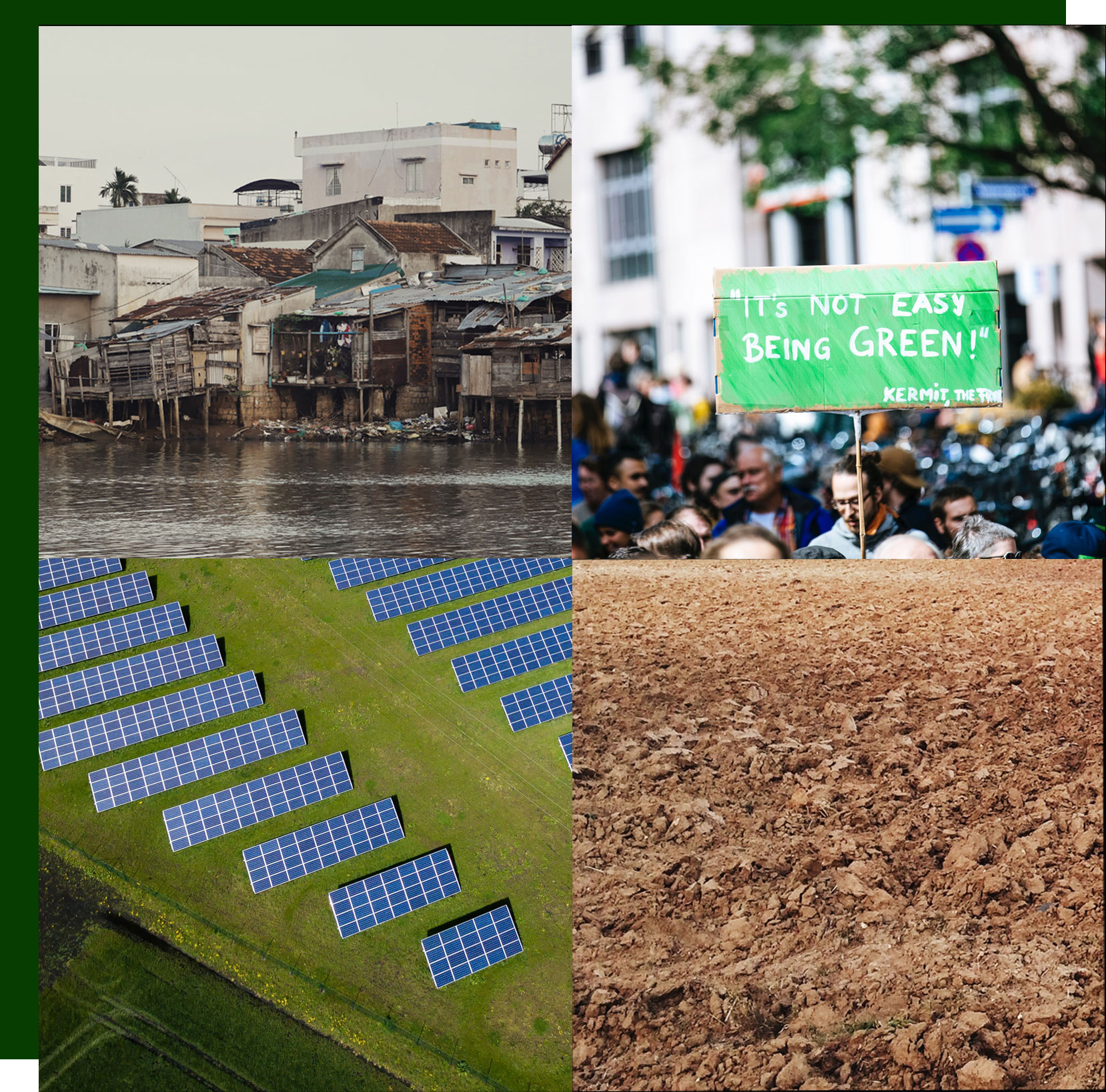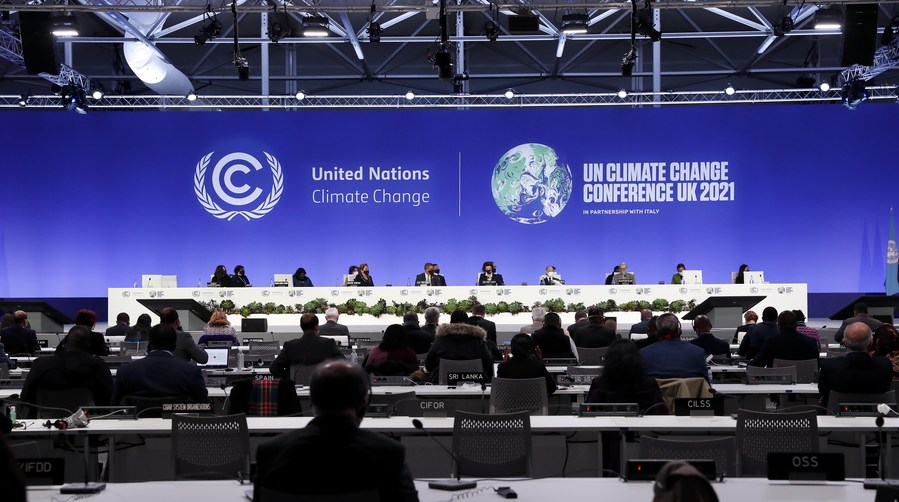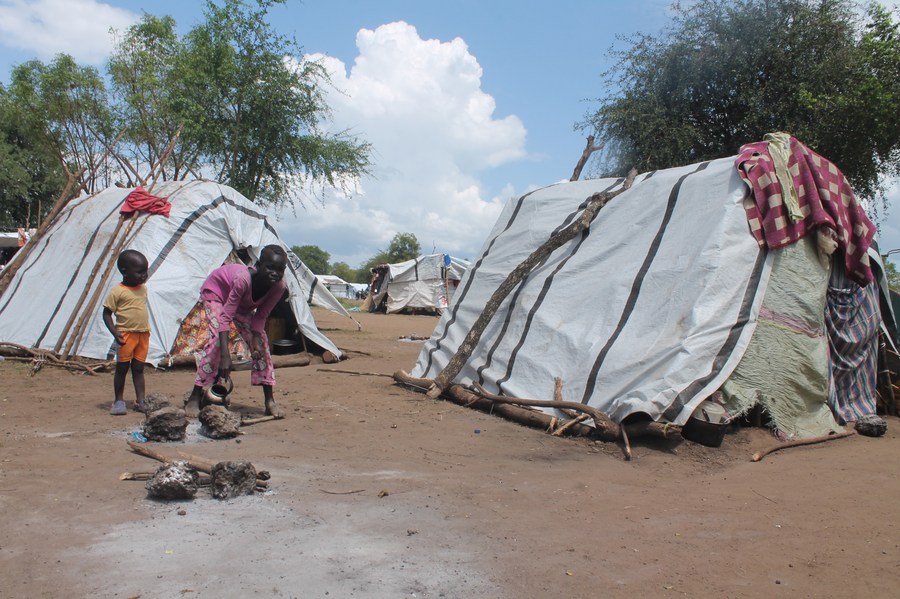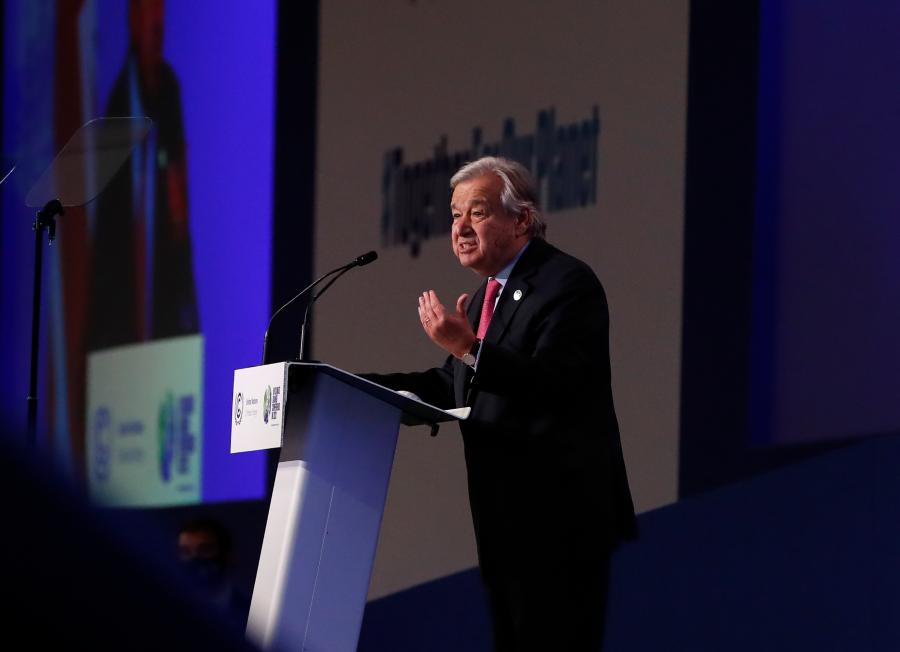Hypocrisy in some rich nations’ climate policies

Illustration/People's Daily Online
Let’s try solving some word problems first:
a. To alleviate a prolonged food shortage, City Z plans to distribute its emergency food stockpile. District A, a relatively backward part of the city with 1,341 people, and District E, an influential and affluent area in City Z that houses 748 residents, are rationed 120 tons of food aid. How much aid should they each receive?
b. Amid an anti-littering campaign, Neighborhood Y has urged its community members to reduce the amount of waste they produce. Household C, a family of 12 that produces 3 tons of waste annually, and Household M, a family of 3 that creates 2.85 tons of waste a year, collectively, need to trim 2 tons of waste a year. How much less trash should they create respectively each year?
Well, such problems would appear to fall into the easy math category. In problem a, aid should be rationed proportionately according to the overall demand of each district. As for problem b, which is a bit trickier, the per capita outputs should weigh in (meaning members of the household with higher per capita outputs should make greater efforts). The methods may be different, but their goals are the same—to allow each person to get his/her fair share of gains and burdens.
But in real-world applications to similar global problems, which can be much more puzzling given varied national conditions and the complex geopolitical landscape, some rich nations’ calculations appear to be flawed, irrational, and even immoral.
In their mad scramble for COVID-19 vaccines, some rich nations have neglected the presence of the developing world, whose citizens were also in dire need of more doses but often haven’t gotten access to any. But when it comes to the big theme of climate change, developing countries, most of which were absent in previous fuel-guzzling industrial revolutions and remain in the early stages of development, are suddenly designated by rich countries as the major players.
Historically, developed countries ARE responsible for almost 80 percent of global cumulative carbon emissions, yet some rich nations are attempting to fashion together a false impression that they are working hard on the issue while the developing world isn’t cooperating or doing enough.
Not only have they ignored the facts that climate change is a progressive event in which developed nations’ excessive carbon footprints dating back to the industrial revolution is the real culprit behind the already occurring 1.2°C temperature rise , but they have also been trying to pressure poorer countries, who haven’t shared in the same technological and economic advantages, to cut emissions on a similar scale and to their own satisfaction.

Photo taken on Oct. 31, 2021 shows a general view of the opening ceremony for COP26 in Glasgow, Scotland, the United Kingdom. (Xinhua/Han Yan)
During the ongoing UN Climate Change Conference (COP26) in Glasgow, leaders from the rich world have set their climate targets sky-high, making a heap of mitigation promises, meanwhile reviling developing nations for not keeping up with their pace.
Former US President Barack Obama, who 12 years ago in Copenhagen had stunned the world with his ambitious and refreshing speech but later failed to sustain his climate agenda at home, staged a comeback at COP26, in which he grabbed most of the global listeners’ attention, though not for his reflections on previous failures, but for his unwarranted attacks on China and Russia simply because their leaders didn’t show up in person, matching what he and some of his colleagues did with their luxury private jets and noisy limousines.
Loud as they are, they can hardly convince the skeptical developing nations, who have in the past witnessed too many broken promises, unfulfilled targets, and numerous farces, including the one where the US walked away from the “gigantic” issue of climate change, to embark on their unrealistic and unreasonable climate proposals.

Children were at a temporary camp hosting flood victims in Mangalla, South Sudan, on Oct. 23, 2020. (Xinhua/Gale Julius)
For 734 million people who live on less than $1.90 a day, they have to carry the weighty burdens of climate change before even knowing that such a phenomenon even exists. When copious rainfall and capricious droughts frequently visit upon their lands, depriving them of food and shelter, they have no idea that in sumptuous halls oceans away, leaders from some rich nations are pressing for greater mitigation efforts and expecting them to follow suit.
Foreign Policy on November 3 published a sobering essay entitled Rich Countries’ Climate Policies Are Colonialism in Green, in which the author Vijaya Ramachandran, director for energy and development at the Breakthrough Institute, examined the hypocrisy and cruelty in some rich nations’ climate policies.
In the article, the author highlighted that Norway, the second-largest gas supplier in Europe, “is advancing the green version of colonialism.” The northern European country, amid an acute energy shortage, has just hammered a deal to increase its natural gas exports by 2 billion cubic meters; but in the meantime, it has been “lobbying the World Bank to stop all financing of natural gas projects in Africa and elsewhere as soon as 2025.” “It’s the rich world telling the global south to stay poor and stop developing, which under no scenario is possible without a vast increase in energy use,” the author wrote.
Besides Norway, some other rich countries have also pursued similar “hypocritical, immoral and unjust” policies.
U.S. President Joe Biden has recently urged major energy suppliers to ramp up their energy production volumes in a bid to boost economic recovery, shortly before he joined other G7 leaders to agree on ending all financing for fossil fuel development overseas next year. The UK, which has pledged to make climate its “foremost international priority,” earlier this year proposed to build a controversial coal mine in Cumbria, a county in North West England, and last year, it greenlighted a plan to build the biggest gas power station in Europe. Canada, a nation that is in close proximity to the Arctic and therefor extremely susceptible to climate change, has in recent years continued to advance its case for building the contentious Trans Mountain oil pipeline, adopting an alibi that the profits generated from the pipeline will “aid ” the construction of future renewable energy projects.
One of the biggest hypocrisies perpetrated by the world’s rich countries lies in their 100-billion-dollar promise to provide climate financing to developing countries, a promise that has never actually materialized. Roughly twelve years ago at the Copenhagen Climate Change Conference, which was dubbed by many as humanity’s “last chance”, rich countries vowed to channel 100 billion dollars each year by 2020 to poorer nations in order to help them address the impacts arising from climate change. For each subsequent year, however, rich countries fell short of that target, and an OECD report has predicted that the climate financing target won’t be met until 2023.

UN Secretary-General Antonio Guterres addresses the opening ceremony of the World Leaders Summit at the 26th United Nations Conference of Parties on Climate Change (COP26) in Glasgow, Britain, Nov. 1, 2021. (Xinhua/Han Yan)
But climate change accompanied by extreme weather events is incessant and taking a compounded toll on the developing world, especially for the least developed countries (LDCs). Some of them, countries that have never fully recovered from colonialism, foreign invasions, regional conflicts, and fresh waves of floods, droughts, and famines, have shared little to no slice of the “industrial revolution pie” and are still just managing to get by in feeding their populations, yet somehow finding themselves being dragged into contributing to a weighty mission in which they have to wean themselves off from coal and natural gas within a few years while directly transitioning to a greener and often a more expensive way of life.
That’s why some rich countries’ emissions reduction policies are so irrational and immoral. They are chanting dry slogans, making empty promises, offering rubber checks, setting unrealistic targets and, in the meantime, persisting with their own energy schemes while expecting that poorer countries, who have much lower cumulative and per capita carbon emissions, to somehow put climate at the top of their agenda. Instead of devising international climate targets and timetables on a country-by-country basis, a bottom-up approach that takes into account various national conditions, some rich countries have preferred to pressure other nations to act without placing themselves in their counterparts’ shoes. That’s hypocrisy in nature. Hypocrisy in green.
Photos
Related Stories
- China takes concrete actions towards tackling climate change
- Why China's climate change dedication credible and attainable
- China contributes to global carbon emissions reduction
- All lip service, no actions -- Developed countries urged to walk the talk on climate crisis
- A divided America casts a shadow on global response to climate change
Copyright © 2021 People's Daily Online. All Rights Reserved.










